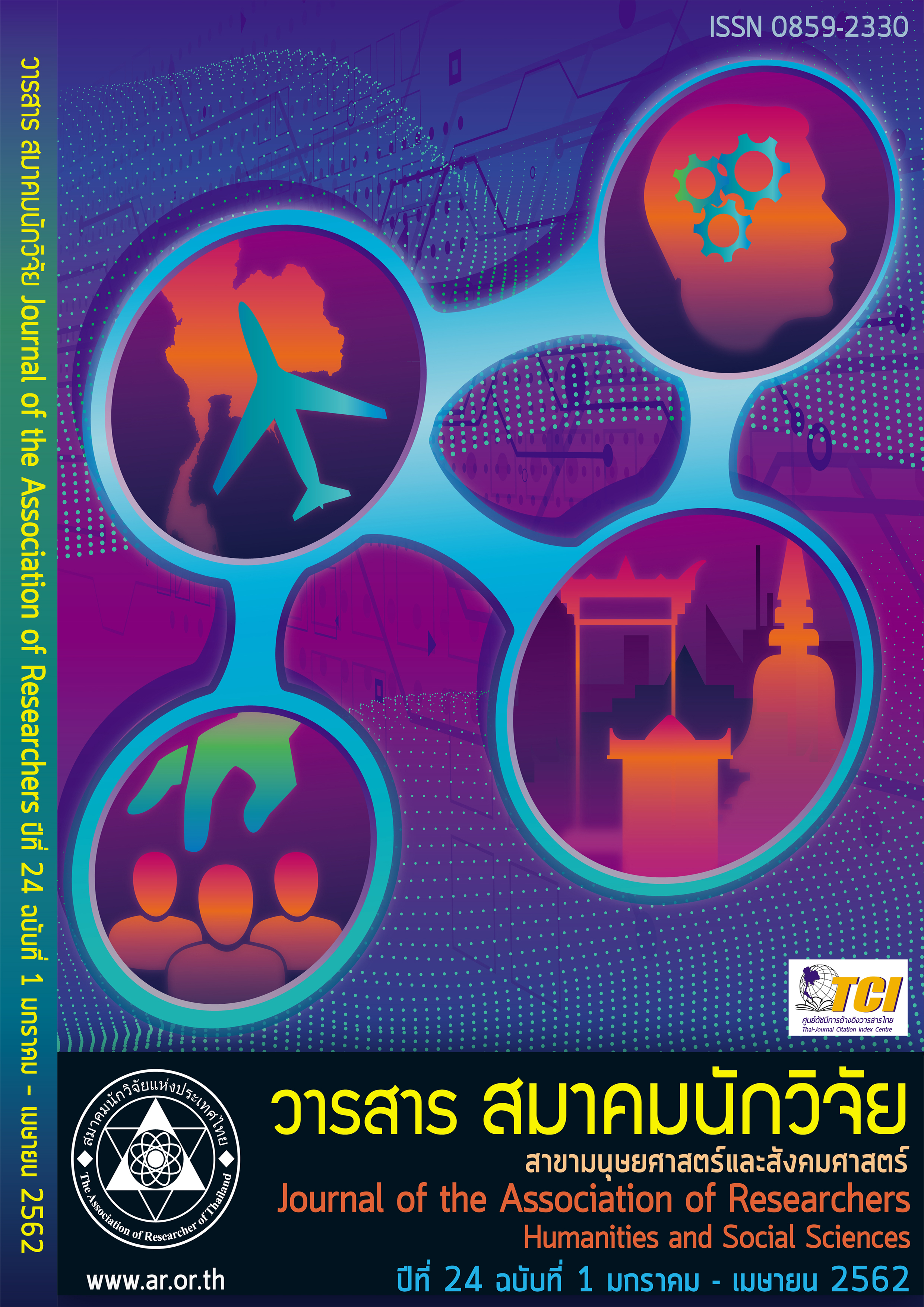A Study on Relationship among Inspirational Leadership, Organizational Culture, Learning Organization and Organizational Effectiveness in Context of the Courts of Justice.
Main Article Content
Abstract
The main purpose of this paper is to investigate the relationship among inspirational leadership, organizational culture, learning organization and organizational effectiveness in context of the court of justice. A correlational research design has been employed. The structural equation modeling technique is applied. The research results indicate that both inspirational leadership and organizational culture can positively and significantly affect learning organization and organizational effectiveness. In addition, the learning organization has a significantly positive effect on organizational effectiveness. The fit indices have showed that the model fit the data well.
Article Details
บทความที่ปรากฏในวารสารนี้ เป็นความรับผิดชอบของผู้เขียน ซึ่งสมาคมนักวิจัยไม่จำเป็นต้องเห็นด้วยเสมอไป การนำเสนอผลงานวิจัยและบทความในวารสารนี้ไปเผยแพร่สามารถกระทำได้ โดยระบุแหล่งอ้างอิงจาก "วารสารสมาคมนักวิจัย"
References
พงษ์เทพ จันทสุวรรณ. (2554). ภาวะผู้นำวัฒนธรรมองค์การกับประสิทธิผลองค์การของโรงเรียนในสังกัด กรุงเทพมหานคร: ตัวแบบสมการโครงสร้าง. วิทยานิพนธ์ปริญญาดุษฎีบัณฑิต. สถาบันบัณฑิตพัฒนบริหารศาสตร์, กรุงเทพฯ.
พงษ์เทพ จันทสุวรรณ. (2561). การตรวจสอบความเที่ยงตรงด้านอำนาจการทำนายที่เพิ่มขึ้นของมาตรวัดภาวะผู้นำแรง บันดาลใจ: ความสัมพันธ์ระหว่างภาวะผู้นำและประสิทธิผลองค์การ. วารสารสมาคมนักวิจัย, 23(3), 18-27.
Bagozzi, R. P., Yi, Y., & Phillips. L. W. (1991). Assessing Construct Validity in Organizational Research. Administrative Science Quarterly, 36 (3): 421-458.
Denison, D. R. (1990). Corporate Culture and Organizational Effectiveness. New York: Wiley
Denison, D. R., Cho, H., & Young, J. (2000). Diagnosing Organizational Cultures: Validating a Model and Method. Unpublished Manuscript, University of Michigan Business School. Ann Arbor, MI.: Aviat.
Denison, D. R., Haaland, S., & Goelzer, P. (2003). Corporate Culture and Organizational Effectiveness: Is There a Similar Pattern around the World? Advances in Global Leadership, 3, 205-227.
Edmondson, A.C. (2002). The Local and Variegated Nature of Learning in Organizations: A Group-level Perspective. Organization Science, 13(2), 128-146.
Fornell, C., & Larcker, D. F. (1981). Evaluating Structural Equation Models with Unobservable Variables and Measurement Error. Journal of Marketing Research, 18(1), 39-50.
Gardiner, P., & Whiting, P. (1997). Success Factors in Learning Organizations: An Empirical Study. Industrial and Commercial Training, 29(2), 41-48.
Garrate, B. (1990). An Old Idea That has Come of Age. People Management, 1(19), 25-28.
Gilley, J.W., & Maycunich, A. (2000). Organizational Learning Performance and Change: An Introduction to Strategic Human Resource Development. New York: Perseus Publishing.
Hall, B.P. (2001). Values Development and Learning Organizations. Journal of Knowledge Management, 5(1), 19-32.
Hall, R., & Andriani, P. (2003). Managing Knowledge Associated with Innovation. Journal of Business Research, 56(2), 145-152.
Kalliath, T. J., Buledorn, A. C., & Gillespie, D. A. (1999). A Confirmatory Factor Analysis of the Competing Values Instrument. Educational and Psychological Measurement, 59: 143-158.
Marquardt, M. J. (1996). Building the Learning Organization. New York: McGraw-Hill.
Marsick, V. J., & Watkins, K. E. (2003). Demonstrating the Value of an Organization’s Learning Culture: The Dimensions of the Learning Organization Questionnaire. Advances in Developing Human Resources, 5 (2), 132-151.
Ogbonna, E., & Harris, L. C. (2000). Leadership Style, Organizational Culture and Performance: Empirical Evidence from UK Companies. International Journal of Human Resource Management, 11 (4): 766-788.
Pool, S.W. (2000). The Learning Organization: Motivating Employees by Integrating TQM Philosophy in a Supportive Organizational Culture. Leadership and Organization Development Journal, 21(8), 373-378.
Popper, M., & Lipshitz, R. (2000). Installing Mechanisms and Instilling Values: The Role of Leaders in Organizational Learning. The Learning Organization, 7(3): 135-145.
Quinn, R. E., & Rohrbaugh, J., (1983). A Spatial Model of Effectiveness Criteria: Towards a Competing Values Approach to Organizational Analysis. Management Science, 29 (3): 363-377.
Senge, P. M. (1990). The Fifth Discipline: The Art and Practice of the Learning Organization. New York: Doubleday/Currency.
Robbins, S. P. (2005). Organizational Behavior. 11th ed. Upper Saddle River, N.J: Pearson. Watkins, K. E., & Marsick, V. J. (1993). Sculpting the Learning Organization: Lessons in the Art and Science of Systemic Change. San Francisco: Jossey-Bass.
Chandasuwan, P. (2010). Organizational effectiveness: Conceptual paradox. Rom-Phruek Journal, 28(3), 133-182. (in Thai).
Chandasuwan, P. (2011). Leadership, organizational culture and organizational effectiveness of the schools managed by Bangkok Metropolitan Administration: Structural equation modeling (Doctoral dissertation). National Institute of Development Administration, Bangkok. (in Thai).
Chandasuwan, P. (2018). An examination of incremental predictive validity of inspirational leadership scale: Relationship between leadership and organizational effectiveness. Journal of the Association of Researchers, 23(3), 18-27. (in Thai).


